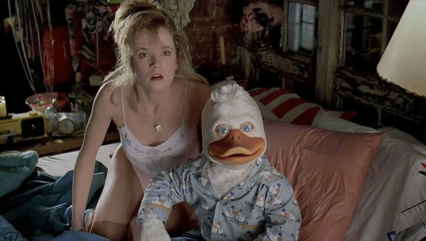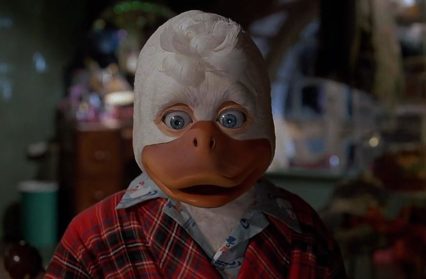In the first of a new series where we ask writers to offer up a defence of some much-maligned book, movie, play, album or any other artistic creation that usually attracts cries of derision and mockery, Gary Raymond offers an impassioned essay on the 1980s LucasFilm/Marvel movie Howard the Duck.
Memories, of course, are precious. Just a few days ago I stumbled upon a small collection of old letters (yes, letters) sent to me by various friends fifteen to twenty years ago. One had a school mate of mine sarcastically bemoaning the fact that on a three year Foreign Office posting to Dhaka in Bangladesh, he had contracted nothing more exotic than dysentery. Twice. Another was a note thanking me for a gift of a Subbuteo team I had sent to a friend in the hospital who had just snapped his femur playing life-sized table football on a stag do. Literary portholes to the moments of our past, the people we were, the lands we inhabited, lack Proustian subtleties, and we can all be diverted by an anecdote or, in this Age of the Image, some photographs of the good old days. The reason why Proust’s mechanism for time travel in A la recherché du temps perdu has become the greatest literary metaphor for the indefinable nature of memory is that when Marcel, Proust’s narrator, bites into that biscuit it triggers not just his senses, but things beyond his senses. It is a memory onslaught that transports him over time back to the smell, sight, feel of his aunt’s parlour. I would argue Proust’s genius is enhanced, not diminished, by the fact his madeleine can be so easily replaced with a talking duck.

In the 1980s, when I was a child, there were two video shops in my home town of Newport. This was before the cold, calculating behemoth of Blockbuster existed, offering up two hundred copies of Pearl Harbour in a nightmarish mausoleum wall of DVD covers. Back then, such stores were privately run, normally by some overweight guy behind a counter whose Star Wars t-shirt was smudged with cigarette ash. Just such a place opened around the corner from my house (which was named Oscars and had a ten feet high Academy Award on its frontage, despite being ironically stuffed with Superman sequels and video nasties). But before Oscars, there was one on Chepstow Road, at the other end of town, far enough away from my enclosed world of Childish adventure as to be a galaxy away. The ritual was that every Friday, on his way home from work, my dad would stop at this video shop and rent me a movie. For many years there was a thrill in seeing what he had for me. It was invariably a surprise. It was my formative film education. Not only was this how I saw the Superman movies (I even had an enormous promo poster of Superman 3 given to me by the video shop owner that stayed on my bedroom wall until I emotionally, if not physically, outgrew it), Indiana Jones…, Back to the Future, but also my dad was curious enough to bring me home new left-field releases like Labyrinth and The Princess Bride and The Dark Crystal and the Ralph Bakshi Lord of the Rings.
Memories of those Friday evening movies not only takes me back to the sofa in the room of the house where I lived until I was eight years old, and sparks off myriad other memories associated with that distant, foreign land, but it reminds me of a time when American movie-making seemed to have boundless and child-like creativity to it. It’s worth pointing out my dad also had some classic misfires. The night he brought me home the 1971 Giuliano Cenci animation The Adventures of Pinocchio, thinking it was the Disney sing-along version (needless to say, Cenci’s version is more loyal to the brutal, depressing, frightening Carlo Collodi novel of 1883). But one film I used to ask for, repeatedly, was the Lucasfilm/Marvel Productions cult meister work Howard the Duck. In the early days, I used to ask for it, and my dear old dad would push back, perhaps worrying for my sanity, maybe only getting it for me once a month. Then he would use it as a fall back if he was tired or in a rush or there wasn’t much else on offer apart from Out of Africa and Maniac Cop 2. And in the end, he would just rent it every Friday. This must have been the closest I got to a child psychologist referral. I must have seen it more than twenty times. At least, that’s my memory.
If you know of the existence of Howard the Duck, it’s unlikely you’ll have heard good things. Watching it as an adult in 2019, it’s difficult to view the movie as anything other than a crude curio, a wild, bizarre fever-dream (for ducks?!) that begs only one questions: why? Nowadays, it’s perfectly reasonable to be bemused by Howard the Duck, repulsed by it, dumfounded, bored, enraged, amused, depressed. It is a movie riddled with the fruit of peculiar decisions, scenes you might imagine were flung onto the screen by drug-addled minds. But it is also a movie that sits at the heart of an American industry that was perhaps at its independent creative peak, where wild minds were making movies that truly were so much more than their elevator pitch, and that was brilliantly made for the unruly, irreverent, boundless creative appetites of the (okay, predominantly male) teen and young adult audiences. Howard the Duck, for me, is a film that sends me back to those Toploader days. It is a pure nostalgia pill. But it is also a movie that stands for something. A Marvel movie that is about as far removed from the megaliths that have shouted and elbowed their way onto the rails of popular culture today, Howard… is a movie that stands as one of the few glorious failures of the golden period of mainstream creativity coming out of Hollywood in the mid-1980s. By god, it’s an important movie.

For the uninitiated: Howard the Duck by Marvel/LucasFilm tells the story of Howard, a duck from a Duckworld, which seems to roughly align with our own, it’s just a bit more ducky. So we see on his apartment wall in the opening sequence, a poster for Raiders of the Lost Duck, with a duck donning fedora and bullwhip, and his stack of Playbill magazines (yes, none of the puns makes sense). Howard is quietly going about his business when he is sucked through time and space and lands in modern-day (1986) human New York City. It turns out a local government project has opened a space porthole. Howard needs to find his way back, but he seems to have arrived on Earth at the same time as a Dark Overlord of the Universe (a sort of Ray Harryhausen bath toy), who takes refuge in the person of the erstwhile avuncular Dr Jennings (Jeffrey Jones). With the help of a Lea Thompson at the apex of her career (and coming off the back of Back to the Future) and a Tim Robbins performance so manic that it feels as if he thinks it might be his last, Howard goes on a hero’s quest for the ticket home, whilst at the same time trying to save Earth from demonic destruction. Beyond that, it’s difficult to describe.
The Marvel/LucasFilm movie origins lie in Steve Gerber’s biting satirical comic books (Gerber was also one of the writers for the Guardians of the Galaxy series and created the graphic novel, Stewart the Rat). In the adaptation, we can trace many of the right angles in the journey from source to the bizarre thing we see on screen. Gerber had created a depressed, foul-mouthed duck whose stories were often metafictional satires following Howard as he tries to make his way through the human world. Gerber famously said, “…that life’s most serious moments and most incredibly dumb moments are often distinguishable only by a momentary point of view.” When adapting the comic for the screen, writer Gloria Katz gave her view. “It’s a film about a duck from outer space,” she said. “It’s not supposed to be an existential experience.”
The end result is that Howard the Duck by Marvel/LucasFilm is a weird fantasy adventure. In 2019, it is certainly too stupid, cheap and camp for most adults, and with hindsight, it’s way too sleazy for kids. (My dad never watched it – this was back in the days when parents were encouraged to put their faith in the gospel of the BBFC rating system). But it is also a movie that sits both comfortably in the B-movie revival stable that brought us films like Attack of the Killer Tomatoes (1978), Killer Klowns from Outer Space (1988), and Critters (1986), as well as the big-budget creative boon that brought us high concept popcorn movies like Back to the Future (1985), The Princess Bride (1987), Labyrinth (1986), Weird Science (1985), Cocoon (1985), Ghostbusters (1984) and even The Adventures of Buckaroo Banzai (1984).
Howard the Duck by Marvel/LucasFilm is the movie that went too far, that got everything wrong, that went down in a blaze of something not quite resembling glory. It couldn’t be made now, but then I’m doubtful if any of those films would get greenlit in the form they were originally made. Those movies are too strange to explain, and they veer too wildly from the tried and tested, they have too much real attitude, way too much real creativity. Howard the Duck is many things, and one of those things is unique. So I can defend it as a powerful personal Proustian biscuit of a movie that flings me through time and space back to my early childhood. But I can also defend it as a work of art, a movie that is out of control yet never relents in its momentum, one that is full of experiments (even if every one of them fails), and has at its centre a kind of duck version of Peter Venkman. If you love extreme cinema, movies that boggle the mind as to how they were made, why they were made, and reminds you what a funny world it is we live in, then Howard the Duck stands alone.
Gary Raymond is a novelist, critic, presenter of The Review Show on BBC Radio Wales and regular contributor to Wales Arts Review.
Howard the Duck is a Marvel/LucasFilm 1980s movie. For more information about the film, click here.
For other articles included in this collection, go here.



 Enjoyed this article? Support our writers directly by buying them a coffee and clicking this link.
Enjoyed this article? Support our writers directly by buying them a coffee and clicking this link.







